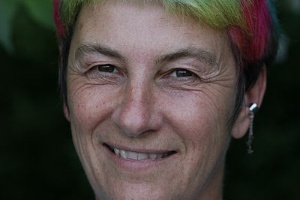ZEN MESTEREK ZEN MASTERS
« Zen főoldal
« vissza a Terebess Online nyitólapjára

Susan Blackmore (1951-)
Tartalom |
Contents |
Odafigyelés Ébredés a mémálomból A vallások mint mémplexek |
Paying Attention, 1995 Ten Zen Questions, 2009 |
PDF: Conversations on Consciousness
2005 Oxford University Press
PDF: A Very Short Introduction to Consciousness
2005 Oxford University Press
PDF: Seeing myself: The science of out-of-body experiences
2017 Little, Brown Book Group
Ten Zen Questions
Oxford, Oneworld Publications, 2009.
224 p.
The paperback edition of Ten Zen Questions is now published with the new title of
PDF: Zen and the Art of Consciousness
2011
I have been practising Zen for nearly thirty years; not as a Buddhist, but as a scientist with a great dislike of religions and dogma. Fortunately Zen lends itself to deep inquiry and a rejection of orthodoxy and so I have managed not to rebel but to learn from its traditional techniques of calming the mind and looking into the nature of experience.
In this book I bring together my scientific training with my Zen practice to delve into ten great questions. Among them are “Who is asking the question?” and “Am I conscious now” as well as some traditional Zen koans. The aim of the book is to see whether personal experience can help penetrate the scientific mystery of consciousness. Many neuroscientists and philosophers working on consciousness believe that a first person approach should be able to do so, but few have attempted to bridge the gulf between science and personal practice.
The book begins with two introductory chapters; Falling into Zen describes my own practice and how I set about tackling the questions, and The problem of consciousness outlines the scientific and philosophical issues at stake. There are then ten chapters devoted to the questions, a very brief conclusion and, finally, a critical commentary from my own Zen teacher.
I found struggling with these questions an enormous challenge. The idea of writing about them is not to provide final answers but to show how intellectual inquiry and meditational inquiry can be brought together to tackle some question that are, at the moment, real mysteries for science.
Contents
Preface/acknowledgements
Falling into Zen
The problem of consciousness[Excerpt on Spiritual Naturalist website:]
1. Am I conscious now?
2. What was I conscious of a moment ago?
3. Who is asking the question?
4. Where is this?
5. How does thought arise?
6. There is no time
7. When are you?
8. Are you here now?
9. What am I doing?10. What next?
Being conscious
Response of a Zen Master
Further reading
Index
Susan Blackmore discusses the 10 zen questions considered in her recent book, Zen and the Art of Consciousness. Although they appear simple, the questions may be more tricky than you think, as Susan reveals.
What happens next?
What am I doing?
Are you here now?
When are you?
There is no time. What is memory?
How does thought arise?
Where is this?
Who is asking the question?
What was I conscious of a moment ago?
Am I conscious now?
http://tenzenbookblog.wordpress.com/
https://www.psychologytoday.com/us/blog/ten-zen-questions
http://www.susanblackmore.co.uk/Books/Tenzen/index.htm
http://www.susanblackmore.co.uk/Zen/intro.htm
https://plymouth.academia.edu/SusanBlackmore